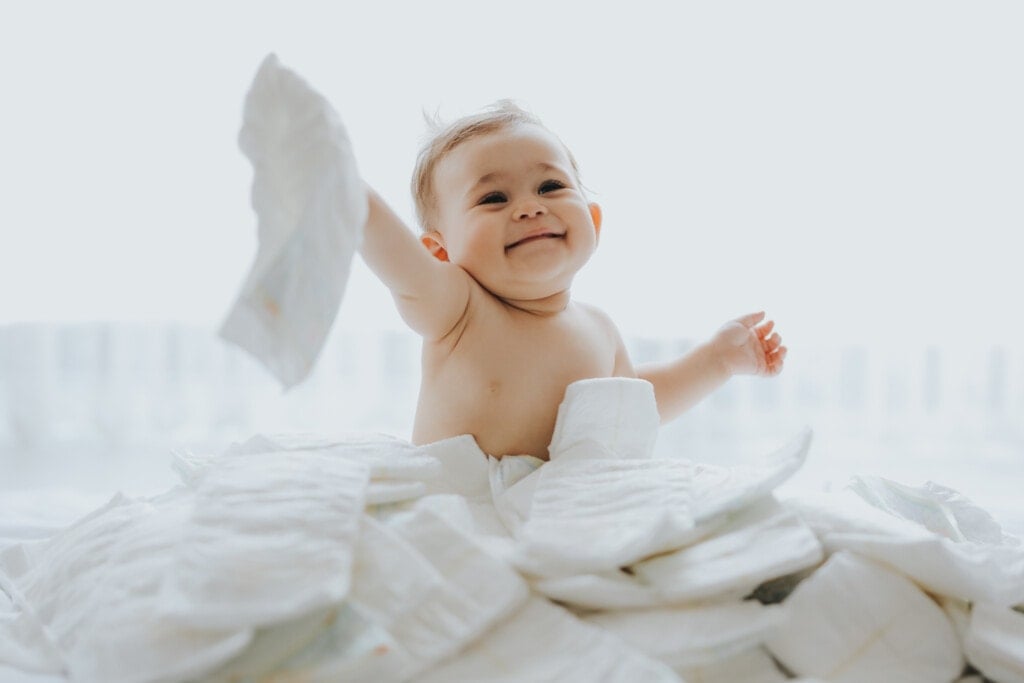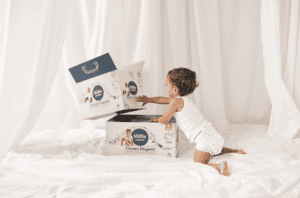When your newborn enters the world, you want to do everything you can to keep your bundle of joy safe and healthy. You likely spent extensive time researching baby product safety standards before purchasing. You’ve looked closely at skincare items, bottles, toys, furniture, clothes, and even accessories. Just when you thought you picked out everything you needed, you come to the agonizing realization that you still need to decide on a diaper brand.
With countless lines to choose from—and room for more to appear, as the market is expected to grow by 0.62% each year—selecting the best diaper brand can be an overwhelming process.1 You need to take into account their levels of absorbency, softness, comfort, and affordability. But also, you’ll need to consider the materials and ingredients they’re made from.
Unfortunately, disposable diapers that stock the shelves of stores today may contain toxic chemicals that can hurt your infant’s fresh skin. Not to mention how they play a role in harming the environment. According to the U.S. Environmental Protection Agency, disposable diapers account for 4.1 million tons of waste added to landfills each year.2 They can also introduce pathogens into the environment, potentially polluting drinking water.3
Whether you’re considering buying organic diapers to keep your little one in good hands or want to help make an impact on the environment, we’re here to provide guidance. We’ve broken down key factors to cut through the noise of confusing packaging and labels. This will help you decipher what makes a diaper organic, weigh its validity, and find the brand you need.
What’s an Organic Diaper?
In the first few months of your newborn’s life, you’ll change their diaper up to 12 times in one day. You’ll go through an average of about 2,000 to 2,500 diapers their first year. We recommend not calculating the total hours you’ll spend keeping their tushes clean!
With infants spending almost all of their time in diapers, your quest to find the best one is important. Organic diapers are made from plant-based materials, like bamboo, hemp, and cotton. They can be biodegradable. They’re also free of chlorine, fragrances, dyes, bleach, latex, and other toxic substances. When searching the diaper aisles of Target or Walmart, be vigilant of special packaging labels that indicate the required organic standards have been met.
Standards of an Organic Diaper
The proof is in the pudding, or in this case, in the certifications of organic diapers. Trusted organic diapers will have one to two labels printed on their packaging that identify the legitimacy of their organic textiles. Look for “Organic 100 Content Standard (OCS)” or “Global Organic Textile Standard (GOTS).” These two certifications inform you that the necessary standards for being considered organic have been met.
Organic 100 Content Standard
The OCS is a standard that verifies a non-perishable product was made from organically-grown textiles and fibers, ranging from 5 to 100% organic materials. The seal is issued by the Textile Exchange, formerly known as the Organic Exchange, an international, non-profit organization.4
To ensure the diapers are made entirely with organic material, look for the “OCS 100” logo or the statement “Made with/Contains 100% Organically Grown Material.” Companies may use these only for products that contain 100% organic material. For diapers that are made with 95% or more organic textiles, the packaging may state, “Made with/Contains Organically Grown Material.”
Global Organic Textile Standard
As the worldwide leading textile processing standard for organic materials, GOTS has the most stringent requirements of any organic standard.5 Its certification ensures the organic harvesting of raw materials. It also requires the entire process—manufacturing, packaging, labeling, trading, and distribution—to be environmentally- and socially conscious.5
GOTS-certified textiles labeled as organic must also be made from at least 95% organic natural fibers. Whereas personal care items, like diapers, can be made of only 100% organic fibers. Additional GOTS requirements include the omission of fragrances, dyes, formaldehyde, heavy metals, and bleach. But the list of banned toxic substances is much longer.5
Types of Organic Diapers
Cloth
Yes, cloth diapers are back in. The old-fashioned method of diapering has found its way into modern parenting again. Fortunately, they’ve come a long, long way. The reusable fabric comes in various styles (flats, prefolds, fitted, and all-in-ones). They can be thrown into the washer for next use, helping you save money. Don’t forget that you can be free of late-evening emergency trips to the store when you’ve realized you’re down to your last batch of diapers.
The downsides, which you’re probably already thinking of, are the deep clean-up to be able to reuse them, the extra loads of laundry you’ll have to do, and the frequent changes due to their lack of absorbency.
Biodegradable
If cloth diapering isn’t cutting it for you, turn to biodegradable diapers. Similar to conventional diapers in that they’re disposable, biodegradable diapers can be used once then tossed in the trash for easy clean-up. The key difference, though, is they’re made from nature and free of plastics. So they can break down naturally and turn back into the soil.
Compostable
Unlike biodegradable diapers, compostable diapers can be, well, composted. When added to compost, they will complete their natural process and break down without any aid. But this does not mean you can add them to the compost bin in your backyard. Instead, you must send them to a special facility that will properly get the job done. Luckily, there are several compostable diaper services available that will collect and compost your baby’s dirty diapers for you.
While there are several things to decide on as you’re preparing for your little one’s arrival, finding the right safe, eco-friendly diaper is less daunting than it may seem. If you’re struggling to pick one brand, try a few to see what works best for your budget, lifestyle, and most importantly, for your baby.






























